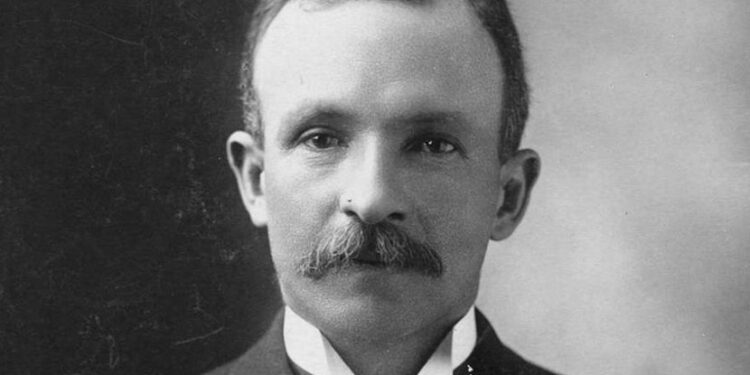Charles Waddell Chesnutt is a famous American Novelist
Early Life and Background:
Born in 1858 in Cleveland, Ohio, Charles Waddell Chesnutt was raised by free African American parents with mixed-race ancestry. Growing up in a diverse community, Chesnutt witnessed firsthand the complexities of race relations in America. Despite facing racial discrimination and limited educational opportunities, Chesnutt displayed a keen intellect and a passion for literature from a young age. He worked various jobs before pursuing writing as a career.
Literary Career and Achievements:
Chesnutt’s literary journey began with the publication of his short stories in esteemed magazines like The Atlantic Monthly and The Colored American Magazine. His early tales, including “The Goophered Grapevine” and “The Conjure Woman,” earned critical acclaim for their vivid depictions of Southern life and folklore. In 1899, Chesnutt released his debut novel, “The House Behind the Cedars,” a poignant exploration of racial identity and passing that firmly established him as a literary force.Charles Waddell Chesnutt is a famous American Novelist
Continuing to write prolifically, Chesnutt authored novels like “The Marrow of Tradition” (1901) and “The Colonel’s Dream” (1905), tackling themes of racial injustice and the legacy of slavery in the post-Reconstruction South. Despite facing obstacles in gaining widespread recognition due to his race, Chesnutt’s works were praised for their literary craftsmanship and social commentary.
Also Read-
- James Weldon Johnson is a Literary Luminary in American Poetry
- Robert Frost a Legacy in American Literature
- T.S. Eliot a great Contribution in American Literature
Thematic Explorations:
At the core of Chesnutt’s fiction lies a profound exploration of race and identity in American society. His novels and stories delve into the experiences of African Americans navigating the challenges of post-Civil War America, addressing issues of racial prejudice, colorism, and the pursuit of equality. Chesnutt’s nuanced portrayals of African American characters challenged stereotypes, offering readers a more authentic understanding of Black life in the South.Charles Waddell Chesnutt is a famous American Novelist
Furthermore, Chesnutt’s fiction often examined the intersections of race, class, and gender, shedding light on the systemic injustices faced by marginalized communities during the Jim Crow era. Through his exploration of these themes, Chesnutt aimed to spark critical reflection and inspire societal change, advocating for empathy, understanding, and solidarity across racial divides.
Historical Context and Significance:
Chesnutt’s literary accomplishments are inseparable from the historical backdrop of post-Reconstruction America, a period marked by racial segregation and widespread violence against African Americans. As one of the few African American authors to gain prominence in the predominantly white literary world, Chesnutt challenged prevailing racial attitudes and contributed to broader conversations about race and representation.
Despite encountering limited publishing opportunities and censorship of his works, Chesnutt’s novels and stories left an enduring impact on American literature, paving the way for future generations of African American writers. His commitment to portraying the complexities of African American life with authenticity and empathy remains a cornerstone of African American literary tradition, inspiring subsequent writers to confront issues of race and identity with courage and honesty.Charles Waddell Chesnutt is a famous American Novelist
Enduring Legacy:
Charles Waddell Chesnutt’s legacy as an American novelist endures as a testament to his literary brilliance and social conscience. His pioneering efforts to challenge stereotypes and advocate for racial justice laid the groundwork for future African American writers, from Zora Neale Hurston to Toni Morrison. Chesnutt’s works continue to be studied and celebrated for their literary merit and historical significance, offering readers profound insights into the complexities of race, identity, and social inequality in America.
Conclusion:
Charles Waddell Chesnutt’s legacy as an American novelist is one of profound significance, marked by his courageous exploration of themes related to race, identity, and social justice. Through his groundbreaking novels and short stories, Chesnutt challenged prevailing stereotypes and offered nuanced portrayals of African American life in the post-Civil War South.Charles Waddell Chesnutt is a famous American Novelist
His commitment to authenticity and empathy, coupled with his literary craftsmanship, paved the way for future generations of African American writers and contributed to broader conversations about race and representation in American literature. Chesnutt’s enduring legacy continues to inspire readers and scholars, serving as a reminder of the power of literature to provoke critical reflection and foster understanding in the ongoing pursuit of equality and justice.
FAQ:
1. What were Charles Waddell Chesnutt’s major literary achievements?
Charles Waddell Chesnutt’s major literary achievements include his groundbreaking novels such as “The House Behind the Cedars” and “The Marrow of Tradition,” as well as his acclaimed short stories like “The Goophered Grapevine” and “The Conjure Woman.” These works challenged stereotypes and offered nuanced portrayals of African American life in the post-Civil War South.
2. What themes did Chesnutt explore in his writing?
Chesnutt’s writing explored themes related to race, identity, and social justice, addressing issues such as racial prejudice, colorism, and the pursuit of equality. His works often delved into the complexities of African American experiences in the post-Reconstruction era, shedding light on the systemic injustices faced by marginalized communities.
3. What historical context influenced Chesnutt’s work?
Chesnutt’s literary accomplishments are rooted in the historical context of post-Reconstruction America, a period marked by racial segregation and widespread violence against African Americans. His works reflect the social and political realities of the time, offering readers insights into the challenges and complexities of race relations in the post-Civil War South.
4. What is Chesnutt’s enduring legacy in American literature?
Chesnutt’s enduring legacy lies in his pioneering efforts to challenge stereotypes and advocate for racial justice in American literature. His works continue to be studied and celebrated for their literary merit and historical significance, inspiring readers and scholars to confront issues of race, identity, and social inequality with courage and empathy.













